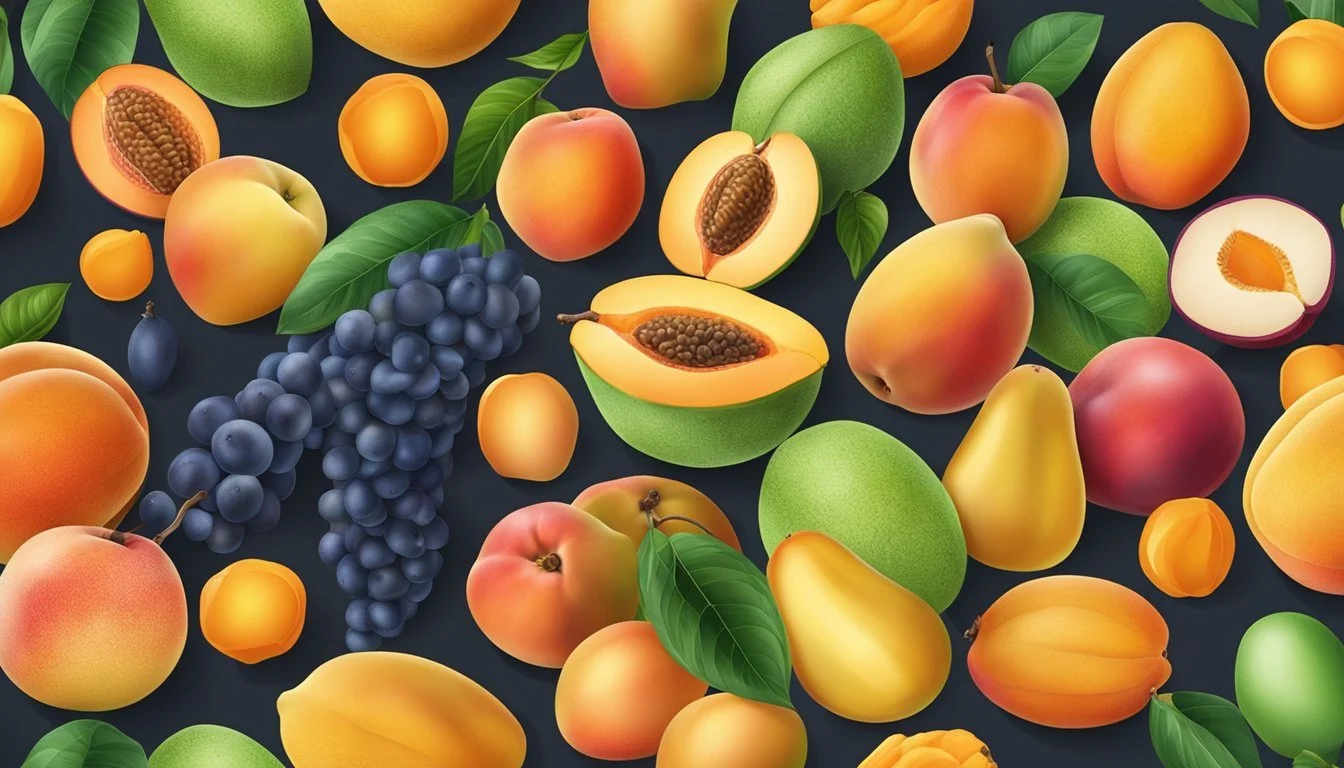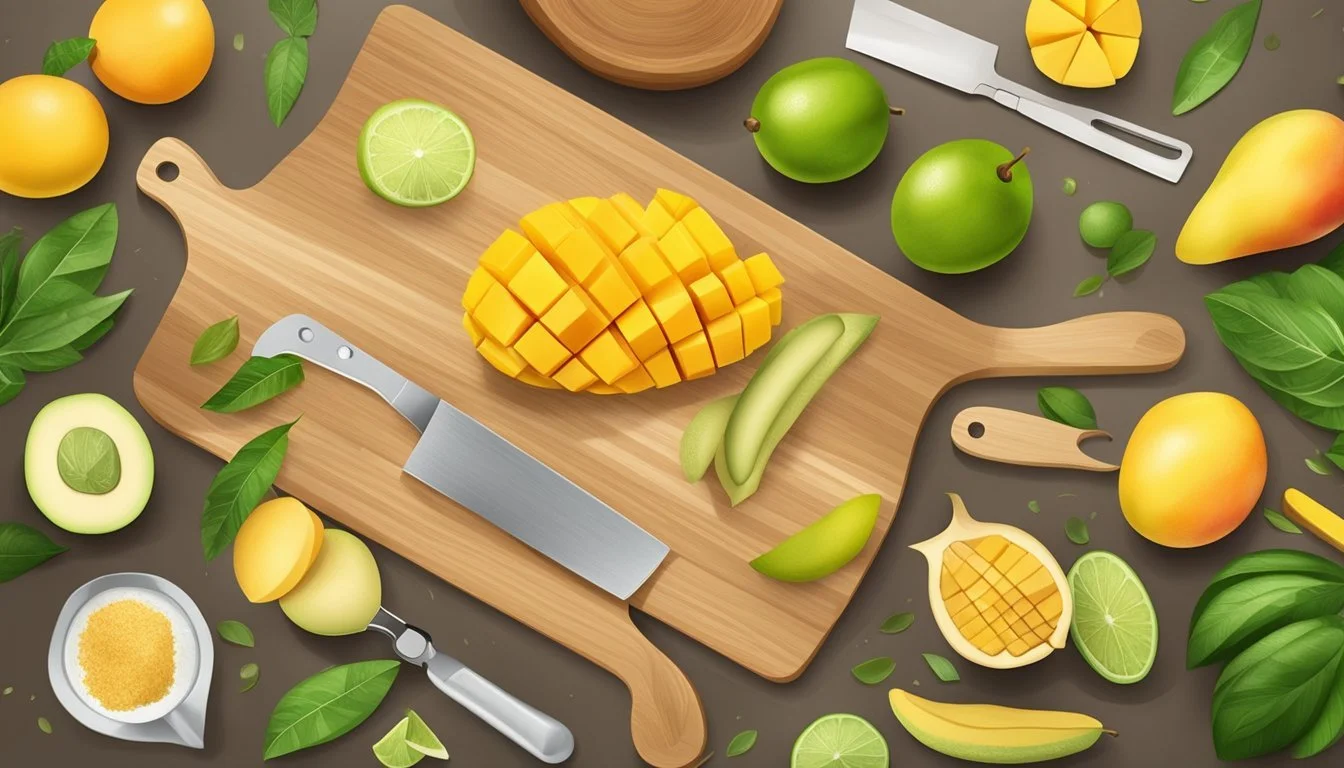Mangoes Substitutes
Top Alternatives for Your Recipes
Looking for a substitute for mangoes? Whether you’re out of season or simply trying to incorporate a different fruit into your dish, several options can stand in for tropical mangoes. For a sweet and slightly musky alternative, papaya can match the tropical flavor and creamy texture of mangoes. Similarly, nectarines, with their firm texture and sweet tanginess, make an excellent choice in both savory and sweet preparations.
For those aiming to replicate the vibrant color and sweetness in salsas, sweet red bell peppers offer a unique, yet effective substitute. If you're blending up a smoothie, nectarines or bananas provide a creamy and sweet consistency that resembles that of mangoes. Each of these substitutes offers their own variety of vitamins, fiber, and antioxidants, contributing to a healthy and flavorful experience.
Whether you're preparing a fruit salad, a sauce, or a smoothie, there’s no need to fret over the absence of mangoes. Choices like apricots and cantaloupe bring unique tastes and textures to your dishes, ensuring you won't miss out on the tropical essence and nutritional benefits such as vitamins and antioxidants that mangoes typically provide.
Health and Nutritional Benefits of Mangoes
Mangoes are packed with essential vitamins, fiber, and antioxidants. They offer numerous health benefits, supporting immune function, digestive health, and providing energy with their natural sugars.
Vitamins and Antioxidants in Mangoes
Mangoes are rich in vitamins A and C, which play crucial roles in maintaining overall health. A single cup of mango provides about 67% of the daily recommended intake of vitamin C, which is important for immune system function and skin health.
Vitamin A, provided through beta-carotene in mangoes, supports eye health and cell growth. Furthermore, mangoes contain powerful antioxidants that protect the body against free radicals, reducing the risk of chronic diseases.
Fiber Content and Digestive Health
One cup of chopped mango contains approximately 2.6 grams of fiber. Dietary fiber is essential for maintaining proper digestive health. It helps prevent constipation by adding bulk to stools and promotes regular bowel movements.
Additionally, the fiber in mangoes supports gut health by fostering beneficial gut bacteria and can help manage cholesterol levels. Including mangoes in the diet aids in better digestion and overall gut function.
Comparison of Sugar and Calorie Content
Mangoes are relatively low in calories, with one cup containing about 99 calories. This makes them a nutritious and energy-boosting snack.
Though they are high in natural sugars, the overall glycemic index is moderate, making them suitable for most diets when eaten in moderation. The natural sugars in mangoes provide a quick energy boost, while their fiber content slows down sugar absorption, helping to maintain stable blood sugar levels.
Mangoes also supply important nutrients such as potassium and folate, contributing to a balanced diet.
Culinary Uses of Mangoes
Mangoes, with their rich, tropical flavor, are versatile ingredients in cooking. They can enhance everything from drinks to desserts, adding a unique twist to various dishes.
Smoothies and Juices
Mangoes bring a creamy texture and vibrant taste to smoothies and juices. They pair well with other tropical fruits like pineapples and bananas. Combining mango with yogurt or coconut milk creates a rich, smooth drink. Mango juice can be blended with orange or carrot juice for a refreshing beverage. Whether used as the primary ingredient or a complement, mangoes elevate the flavor profile of any drink.
Desserts and Purees
Mangoes shine in desserts thanks to their natural sweetness and smooth texture. Mango puree can be used in puddings, mousses, and sorbets. In baking, it adds moisture and flavor to cakes and muffins. For a fresh dessert, a simple mango and cream combination is always a hit. Mangoes also make for excellent toppings for cheesecake or ice cream. Their lush, tropical essence enhances any sweet treat.
Salads and Salsas
Mangoes add a burst of sweetness to salads and salsas. In salads, they pair well with greens like spinach and arugula, as well as ingredients like avocado and feta cheese. For salsas, mangoes mix beautifully with tomatoes, onions, and cilantro. They balance spicy elements with their sweet taste, making them a favorite in many Mexican-inspired dishes. A mango salsa can serve as a topping for grilled fish or tacos, providing a fresh, flavorful garnish.
Marinades and Chutneys
In marinades, mangoes tenderize meat while infusing it with a subtle sweetness. A mango puree mixed with lime juice, garlic, and chili creates a flavorful marinade. Mangoes are also essential in chutneys, where their sweetness counteracts the spices. A classic mango chutney includes ingredients like ginger, vinegar, and sugar, making it a perfect accompaniment for curries and grilled dishes. This combination not only enhances the dish but also introduces a depth of tropical flavor.
Selecting Suitable Mango Substitutes
Finding the right substitutes for mangoes requires considering factors such as taste, texture, and the availability of alternatives. Different substitutes work best in different dishes, depending on these key criteria.
Criteria for Choosing Substitutes
When selecting a mango substitute, it's crucial to consider the flavor profile. Mangoes are sweet and slightly tangy, so the substitute should match this balance. The texture is also important; mangoes are juicy and have a smooth, firm flesh without seeds, unlike some fruits with fuzzy skin.
Culinary use plays a role too. For example, a substitute for a smoothie might differ from that for a salsa. Availability and seasonality of the fruit are other practical factors to consider.
Taste and Texture Matches
Certain fruits align closely with mangoes in taste and texture. Papayas, for instance, share a similar tropical flavor and juicy texture, making them ideal for fruit salads and smoothies.
Nectarines and peaches are also good alternatives due to their stone fruit nature and firm, smooth flesh. Both fruits have a balance of sweetness and tartness that aligns well with mangoes. Kiwis offer a unique combination of tanginess and sweetness, suitable for smoothies and purees.
Availability and Seasonality
The availability of substitutes can vary significantly throughout the year. During the summer months, stone fruits like peaches and nectarines are abundant. Cantaloupe is another summer fruit that can work as a fresh alternative to mangoes.
Bananas, while not a perfect flavor match, are commonly available year-round and can serve as a last-resort substitute in some recipes. Sweet red bell peppers can substitute in savory dishes year-round, thanks to their consistent availability and similar sweet flavor profile.
By considering these factors, one can effectively choose a suitable substitute for mangoes in various recipes, ensuring that the dish remains delicious and true to its intended flavor.
Tropical and Stone Fruit Alternatives
Several fruits can effectively replace mangoes in recipes, matching their texture and sweetness. These alternatives vary from stone fruits like peaches and nectarines to tropical options like papaya and guava, each bringing unique flavors and benefits.
Peaches and Nectarines
Peaches and nectarines are closely related, often interchangeable in culinary uses. Both offer a sweet, juicy flavor profile similar to mangoes. Their skin differs, with peaches having fuzzy skin and nectarines being smooth.
Peaches and nectarines can be used in desserts, salads, and sauces. They provide a firm texture and a tangy sweetness that complements many dishes. Being stone fruits, their seed structure is akin to that of mangoes, making them easy to prepare as a substitute.
Papaya and Guava
Papaya and guava bring a tropical flavor profile to the table. Papaya, with its creamy and sweet flesh, can substitute mangoes in smoothies, salsas, and baked goods. It has a buttery texture when ripe, similar to mango.
Guava, on the other hand, has a unique combination of sweetness and tartness. The flesh varies from white to pink, offering versatility in recipes. Guava can be used in pastries, beverages, and sauces, providing a refreshing alternative to mango.
Kiwi and Starfruit
Kiwi and starfruit are excellent substitutes for mangoes in fruit salads and garnishes. Kiwi's green flesh and tangy-sweet flavor offer a striking visual and taste contrast, making it ideal for tropical fruit dishes.
Starfruit, or carambola, has a distinctive star shape when sliced and a flavor that is both tangy and sweet. Its exotic appearance and texture make it a suitable choice for fruit salads, cocktails, and decorative purposes in culinary presentations.
Apricots and Plums
Apricots and plums are stone fruits with flavors and textures that can stand in for mango in various recipes. Apricots have a soft, velvety skin and a sweet, slightly tart taste. They work well in jams, desserts, and savory dishes when sliced or pureed.
Plums offer a versatile option with their juicy flesh and varying sweetness, depending on the variety. They can be used in sauces, baked goods, and salads. The plum's stone fruit nature makes it easy to prepare, similar to mango, providing an excellent alternative in many dishes.
Non-Tropical Substitutes
When tropical mangoes are not available, various non-tropical fruits can serve as excellent substitutes. Melons, berries, citrus fruits, and other creative alternatives can replicate the sweetness and texture of mangoes in different recipes.
Melons and Berries
Melons, especially cantaloupe, can be a good alternative to mangoes. Cantaloupe offers a similar texture and sweetness, making it a suitable substitute in fruit salads and smoothies.
Honeydew melon is another choice, providing a mild, sweet flavor.
Strawberries and blueberries can also be used in salsas and sauces, adding a burst of color and slight tartness.
Citrus Fruits
Oranges and tangerines bring a vibrant citrus flavor to dishes. Their juicy, sweet segments can replace mangoes in salads and desserts.
For a slightly different flavor profile, limes can be used in dishes requiring a tart component. Lime juice, in particular, is perfect for dressings and marinades.
Grapefruits add a unique combination of sweetness and tartness, making them suitable for fruit salads and seafood dishes.
Other Creative Alternatives
Red bell peppers, surprisingly, can replace mangoes in savory dishes like salsas and sauces. Their sweetness and crunch bring a pleasant texture and flavor.
Green mangoes can substitute ripe mangoes in certain recipes, providing a firmer texture and a tangy taste.
Bananas are another option, with their creamy texture making them ideal for smoothies and baked goods.
Each of these substitutes can bring a unique twist to your dishes while maintaining the essential elements that mangoes typically offer.
Processed Mango Alternatives
Processed mangoes offer convenience and extended shelf life, making them excellent substitutes in various recipes. Key alternatives include using frozen, dried, or canned mangoes, as well as mango extracts and flavorings such as syrups and powders.
Frozen, Dried, and Canned Mango
Frozen Mango:
Frozen mangoes are perfect for smoothies, desserts, and sauces. They retain much of the fruit's original flavor and texture. Simply thaw before using, and they work well in both cooked and raw dishes. Find them in most grocery stores, often pre-cut for easy use.
Dried mangoes have a chewy texture and concentrated sweetness. They are perfect for snacking, baking, and salads. Look for ones without added sugars for a healthier option. Rehydrating dried mango by soaking in water or juice can also make it more versatile for cooking.
Canned Mango:
Canned mangoes are available in slices or chunks, typically preserved in syrup or juice. This option is ideal for desserts, sauces, and salsas. Always check the ingredient list for additional sugars. Drain and gently rinse to reduce excess sweetness if needed.
Mango Extracts and Flavorings
Mango Extract:
Mango extract provides the intense flavor of mango without the fruit's texture. It's available in liquid form and is used in baking, beverages, and desserts. A small amount goes a long way, so use it sparingly to enhance the dish.
Mango Syrup:
Mango syrup is a sweet, concentrated flavoring often used in drinks, desserts, and as a topping for pancakes and waffles. It adds a rich sweetness and distinct mango taste. When substituting for fresh mango, be mindful of the added sugar content and adjust recipes accordingly.
Amchur (Mango Powder):
Amchur, made from dried and powdered unripe mangoes, adds a tangy flavor to dishes. It’s commonly used in Indian cuisine for curries, chutneys, and marinades. A pinch can enhance both savory and sweet recipes without adding moisture.
Jarred Mango:
Jarred mango refers to mango preserved in airtight jars, often in syrup, similar to canned mango. This option offers convenience and a longer shelf life. Use jarred mango in desserts, chutneys, and over ice cream. Always read labels to check for additional preservatives.
Geographical Considerations for Substitutes
The availability of mango substitutes can vary greatly depending on the region. Factors such as climate, local agriculture, and import availability significantly affect which substitutes are accessible and practical to use.
Substitutes in Different Regions
India and Asia
In India and other parts of Asia, tropical fruits such as papaya and pineapple are commonly used as substitutes for mango. These fruits are widely available throughout the year due to favorable growing conditions. Papaya offers a similar texture and sweetness, making it an excellent alternative. Pineapple is another substitute that provides a slightly tangier flavor, suitable for dishes needing a refreshing twist.
South America and Mexico
In South America and Mexico, peaches and nectarines are popular substitutes given their widespread cultivation. These fruits provide a comparable sweetness and are relatively easy to find in local markets. Additionally, bananas can be used, especially in desserts or smoothies, due to their creamy texture and natural sweetness, making them versatile in various recipes.
Africa
African regions often utilize what is locally available and affordable. In many parts, bananas and pineapple serve as common substitutes due to their prevalent cultivation. These fruits not only mimic the texture of mangoes but also bring a unique flavor. Cantaloupe may also be used in melon-producing areas, offering a mild sweetness that blends well with various culinary applications.
Preparing and Cooking with Mango Substitutes
When substituting mangoes in recipes, consider the texture, sweetness, and tartness of the alternatives. Various fruits and even vegetables can be used depending on the dish, whether it is a fruit salad, smoothie, or savory sauce.
Cutting and Prepping Alternatives
When replacing mangoes, it’s crucial to cut and prepare the substitute properly. Sweet red bell peppers can be used in savory dishes, cut into similar-sized chunks as mangoes. Papayas and nectarines have a similar soft texture and should be peeled and de-seeded before slicing.
Apricots make excellent mango substitutes in baked goods. They should be pitted and chopped. For smoothies or purees, consider using kiwi or peaches; both should be peeled and sliced to match the softness and sweet-tart profile of mango.
Nectarines and peaches maintain texture nicely in fruit salads and salsas, easily sliced or diced. To match the appearance and sweetness of ripe mangoes, ensure these fruits are fully ripe before using.
Cooking Techniques for Substitutes
Substitute fruits often require different cooking techniques. Papayas and nectarines can be sautéed or baked in desserts and sauces. The creamy, sweet flavor of papaya pairs well with proteins like chicken or shrimp, enhancing the dish’s tropical profile.
For smoothies, pureed apricots and kiwis replicate the rich texture and sweetness of mango, blending smoothly with other ingredients. Sweet red bell peppers work exceptionally well in cooked salsas and savory sauces, providing both sweetness and a colorful appearance.
When making desserts or baked goods, consider roasting peaches or apricots to enhance their natural sweetness. For low-calorie recipes, these substitutes are also lower in carbohydrates and fat compared to mangoes, making them a healthy alternative.
Trail mix can incorporate dried apricots or papaya chunks to replace dried mangoes, offering similar texture and taste. These substitutes not only mimic the flavor but also provide similar nutritional benefits, such as vitamins and antioxidants, contributing to skin health and overall well-being.








